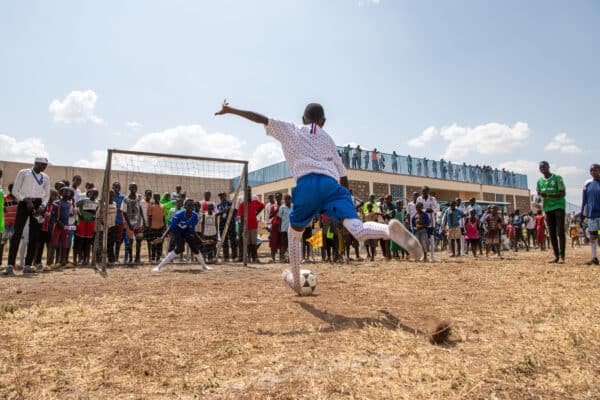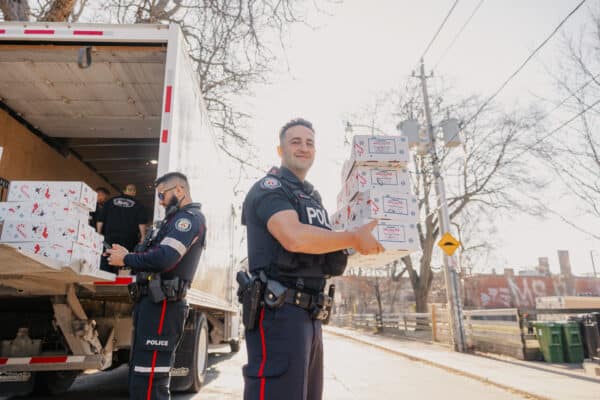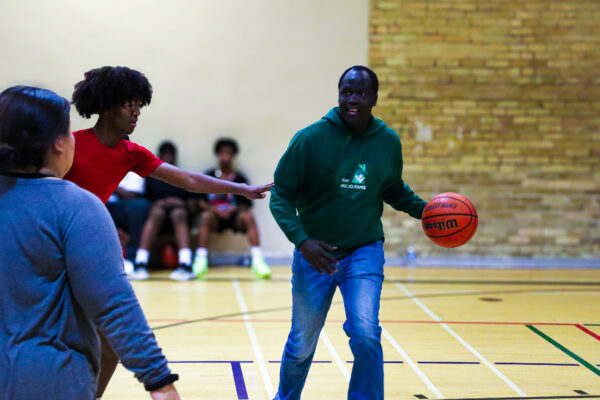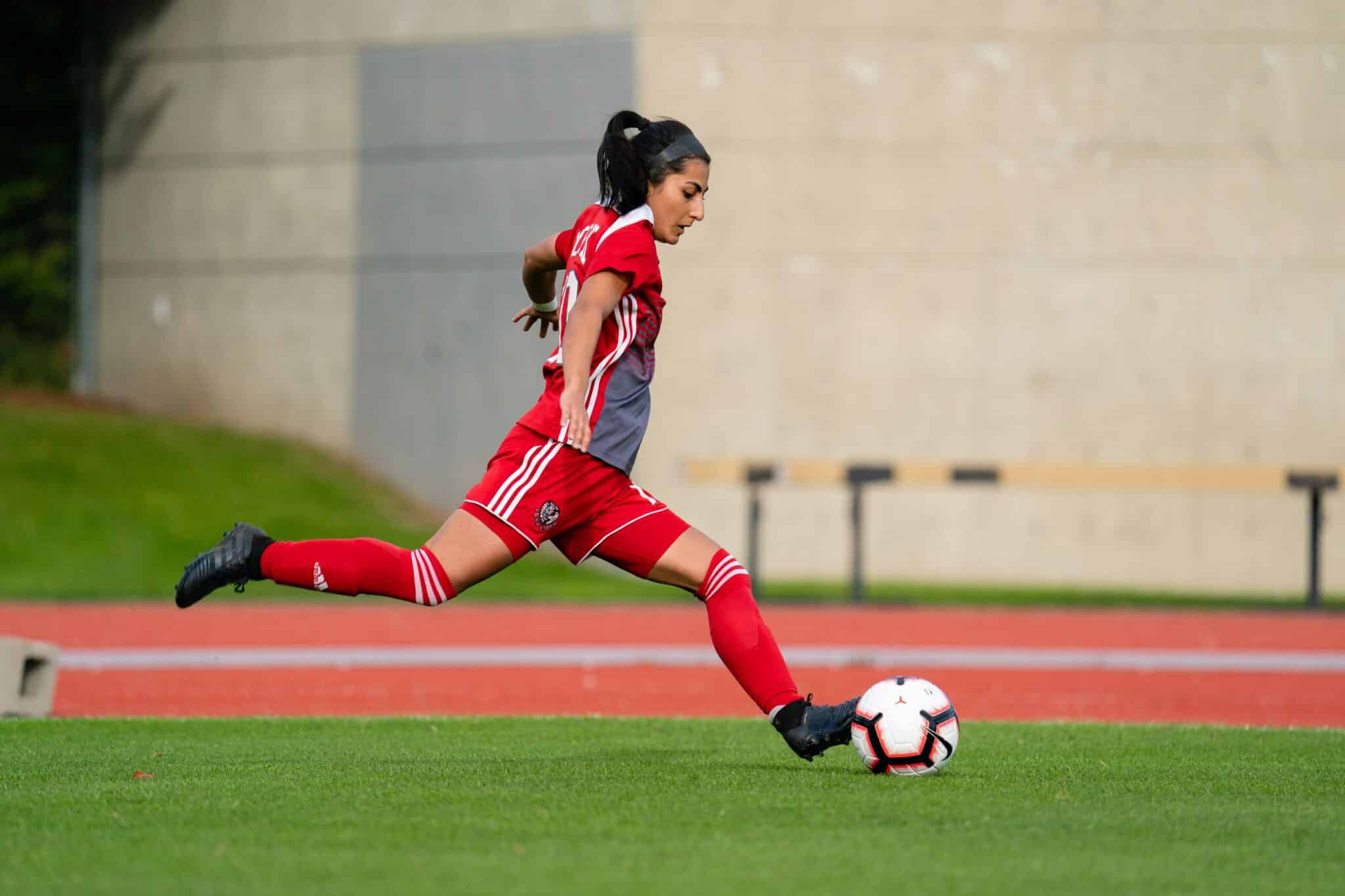
Farkhunda Muhtaj runs on the soccer field. © USports.
Farkhunda Muhtaj was officially the first player named to the roster of Calgary Wild FC, part of the new Northern Super League that launched in Canada in 2025. Number 10 plays midfield and she joined the Wild after captaining both her varsity team at York University and the Afghanistan Women’s National Football Team and a few seasons in Europe.
For Farkhunda, soccer is much more than a game. She knows it can truly save lives.
By Zeba Tasci in Ottawa, Canada
Her family’s journey from Afghanistan to Canada was marked by uncertainty and sacrifice. What began as a temporary displacement eventually became permanent uprooting. Yet, reflecting on that experience, she says, “Coming to Canada was the best decision they could have made.”
When she was two years old, her parents made a life-altering decision. Fleeing conflict in the 1990s, they eventually settled in Canada. It wasn’t the life they had planned, but it was the future they needed.
As a child, Farkhunda didn’t fully grasp the depth of her family’s journey. Raised in Canada by Afghan parents who had fled war, she grew up with stories of sacrifice, resilience, and hope. Today, she is an educator, athlete, and community builder; a proud Canadian with deep Afghan roots. Her story reflects the dual identity experienced by many children of refugees: navigating new beginnings while honoring a homeland still in turmoil.
A holistic upbringing
Growing up in a tightly-knit Afghan-Canadian household in Scarborough, the east end of Toronto, Ontario, Farkhunda’s early life was marked not by material wealth, but by values of generosity, faith, and cultural pride.
“Giving was just what you did. It’s part of Afghan culture. You support your neighbor, your community,” she explains.
She grew up moving between worlds: public school during the day, mosque classes during the week and Persian school on weekends. From the age of four, she was already playing competitive soccer, discovering early that sport could be a powerful way to grow, connect, and lead.
A shifting worldview
Even as a child, Farkhunda noticed how Afghanistan was portrayed in the media: war, poverty, and displacement dominated the headlines. Watching the news with her father sparked an early awareness.
“I never saw anything positive about Afghanistan. But instead of leaving me hopeless, it gave me purpose. If these are human made problems, then we can also be part of the solution.”
– Farkhunda
Initially, she imagined giving back as a teacher or doctor. But while studying kinesiology and health sciences at York University, a new path emerged—one that would merge her academic background with her passion for sport.
Farkhunda had continued playing soccer competitively into her University days. Identified by the Afghan National Program in 2016, Farkhunda was asked to participate in a talent identification camp in May. With the hopes of representing her country, she flew to California to participate, where she was eventually selected to join the team.
Joining the Afghanistan Women’s National Football Team opened her eyes to the stark inequalities faced by women back home. While half the team lived in the diaspora, others remained in Afghanistan, where access to basic resources and freedoms was limited.
“We were all Afghan, but our experiences were completely different. The lack of safety and opportunity was eye-opening,” she recalls.
Captain and catalyst: leading on and off the field
By late 2018 Farkhunda had become captain of the national team, a position that required far more than on-field leadership.
“Wearing the captain’s armband wasn’t just about leading warmups or motivating the team,” she says. “It was about being a bridge. I felt a deep responsibility to represent and protect the voices of my teammates, especially those still living in Afghanistan.”
The team rarely trained in Afghanistan due to security threats. Instead, training camps were held abroad, where the players—many of whom had never met in person—could finally play as one.
In August 2021, the Taliban seized Kabul and began targeting female athletes. The Afghanistan Football Federation reached out to Farkhunda to help organize the evacuation of the youth women’s national team. She was captain of the senior women’s team, an Afghan-Canadian based abroad, and already deeply connected to Afghan football and advocacy, she was uniquely positioned to support these efforts.
“Some girls were in hiding, scared of what people might do. Others didn’t have passports yet. We were working against the clock and against our own fears of what could happen.”
– Farkhunda
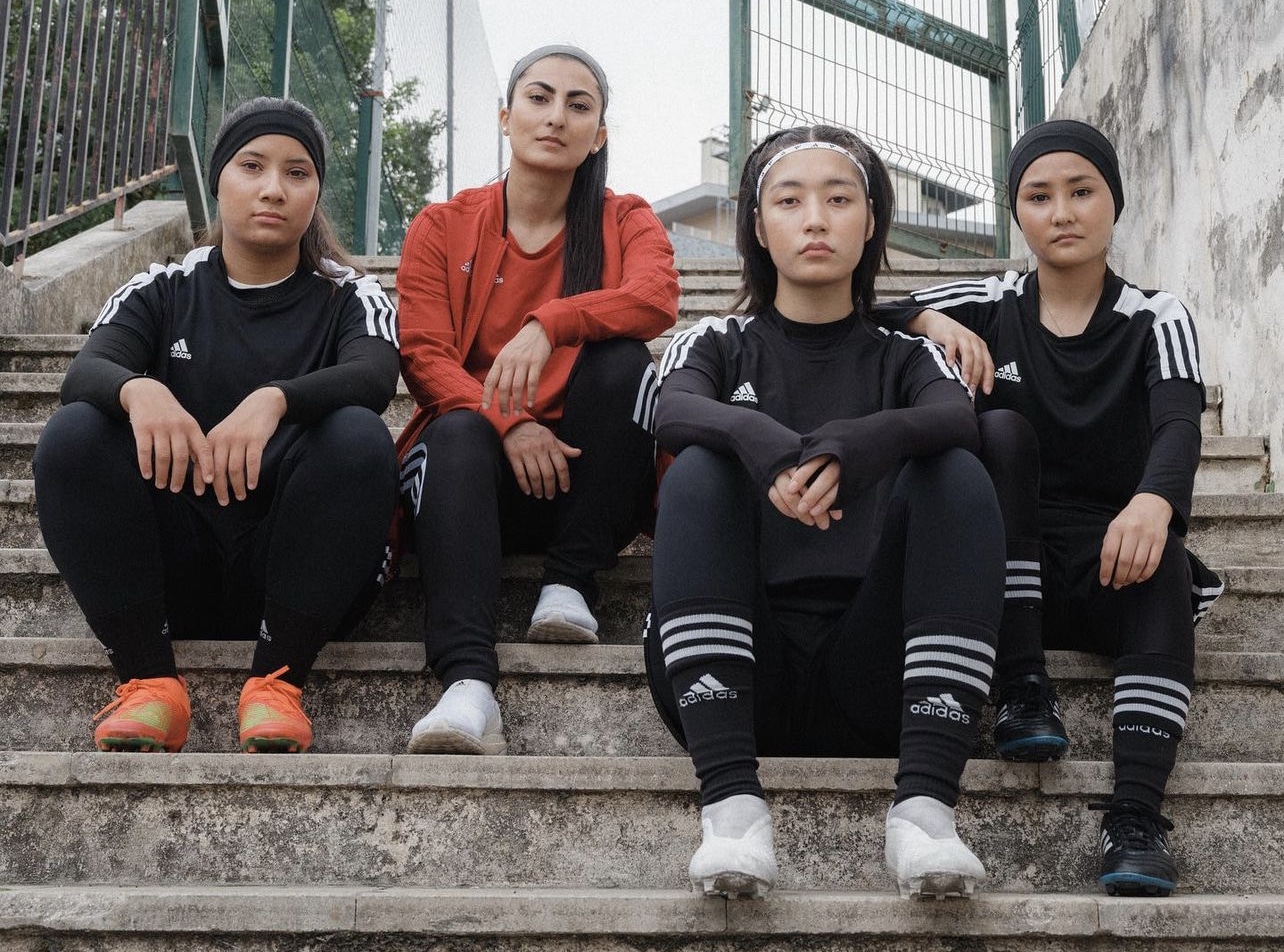
Farkhunda Muhtaj with members of the Afghan Women’s Team. © Razan Alzayani
Without hesitation and operating on minimal sleep, she joined players’ WhatsApp groups, coordinated information gathering and logistics, liaised with humanitarian lawyers, government contacts, NGOs and former intelligence officers to help guide dozens of players and their families to safety. Each successful extraction felt like a miracle.
“It was the most emotionally intense time of my life,” she says. “Every message I got, ‘We made it’, was a wave of relief. But we knew others were still out there, still waiting.”
Though she wasn’t on the ground, her leadership proved vital. For many, she was the only link to hope.
“I wasn’t going to let the world forget them. These girls weren’t just athletes, they were symbols of resistance. And I owed it to them to fight as hard as I could.”
Thanks in part to her efforts, over 300 Afghans, including members of the Afghanistan Youth National Team, were evacuated after the Taliban’s return to power. Many evacuated players have since resettled in countries like Portugal and Germany, where they’re continuing their education and playing careers. Farkhunda remains in close contact with them, mentoring and advocating as they rebuild their lives.
Using sport as a force for change
As she was working to help evacuative women from Afghanistan, in Canada she was also navigating life as a university student, varsity athlete, and professional soccer player. Throughout all this, Farkhunda was also building something bigger: a way to give back locally.
During the COVID-19 pandemic, she noticed a gap: children from underserved communities were missing out on accessible sports opportunities. Drawing on her own upbringing in Scarborough, she co-founded the Scarborough Simbas, a free, grassroots program for kids aged 5 to 12.
“It‘s not just about soccer. It‘s about giving young people a space where they feel seen, valued, and supported.”
– Farkhunda
Every Saturday, children arrived to community check-ins, sports kits, and shared meals with their families. The environment was inclusive, joyful, and healing. Even after moving overseas to pursue professional football, Farkhunda ensured the program continued with a dedicated team of elite-level coaches.
She wanted the children to have access to the best coaching talent.
“It was important for us to have coaches who had played the sport at the highest levels,” she said. “It’s not like, ‘you’re a refugee or newcomer, so let’s give you the bare minimum.’”
Farkhunda explained that they brought in varsity, semi-professional, and professional athletes, not just to share their expertise, but to serve as role models.
“It mattered that they had high-level playing experience, but also that they genuinely connected with the kids and their families.”
– Farkhunda
Today, the Simbas have grown to include seasonal programming, academic support, and partnerships with clubs that offer talented youth a pathway to competitive sport. While funding remains a challenge, the mission remains strong: to give every child the chance to feel seen, safe, and supported, both on and off the field.
Giving back and looking ahead
For Farkhunda, giving back isn’t a choice: it’s a calling rooted in culture, shaped by experience, and guided by a deep sense of justice.
“I always knew I wanted to give back to Afghanistan and to communities like mine,” she says. “At first, I thought I’d do it by becoming a teacher or a doctor. But now I realize there are so many ways to make a difference.”
– Farkhunda
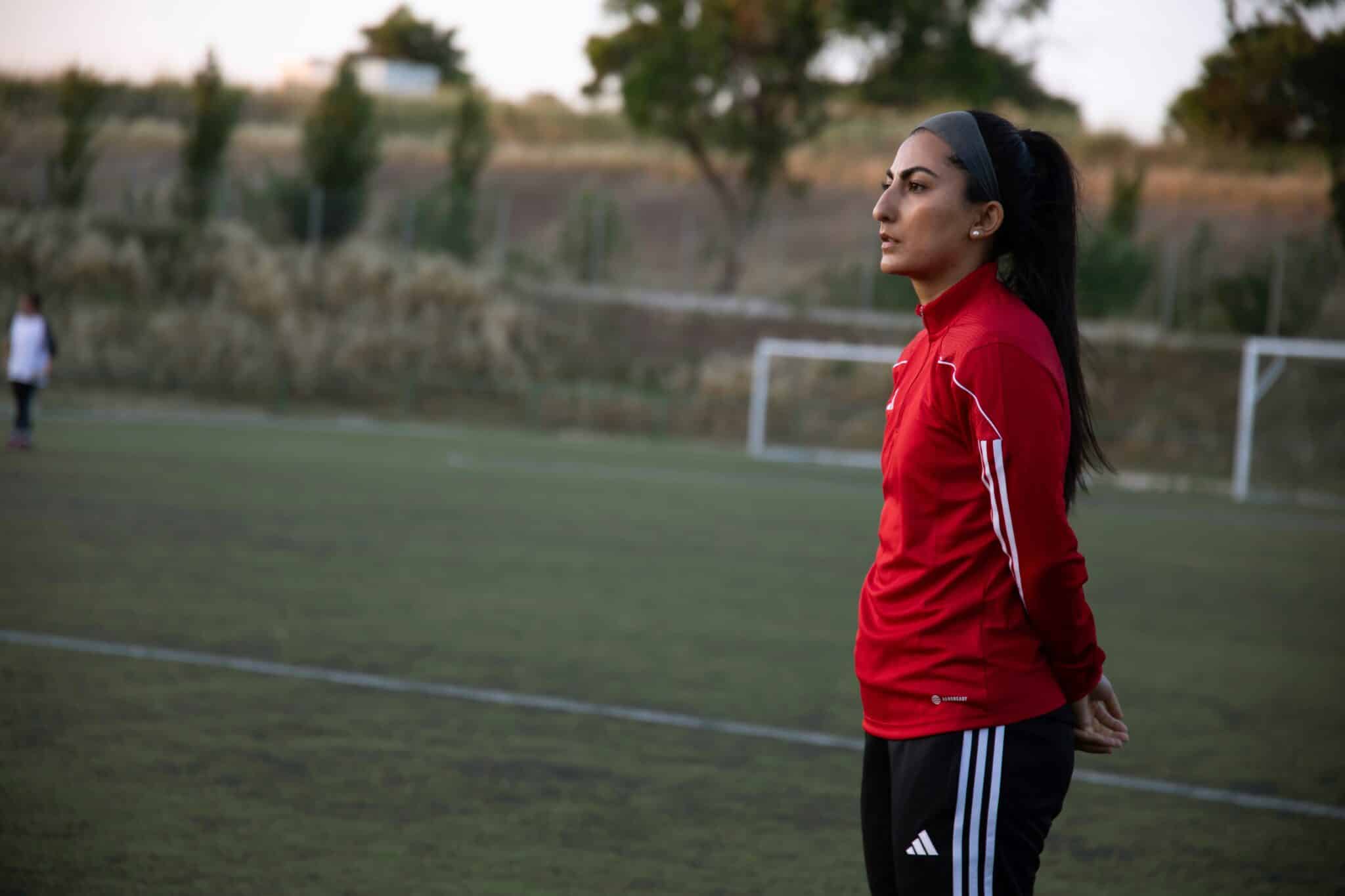
Farkhunda Muhtaj continues to represent both Canada and Afghanistan with pride, purpose, and unwavering resolve. © Farkhunda Muhtaj
Whether through sport diplomacy, youth mentorship, or humanitarian work, she continues to live the dream her parents had when they fled Afghanistan: to build a better, more hopeful future. Now playing for Calgary Wild FC in the Norther Super League, she continues to represent both Canada and Afghanistan with pride, purpose and unwavering resolve.
“I still think about those nights watching the news with my dad,” she says. “I think about the stories we didn’t see, the strength and brilliance of our people. That’s the Afghanistan I want to share with the world.”



